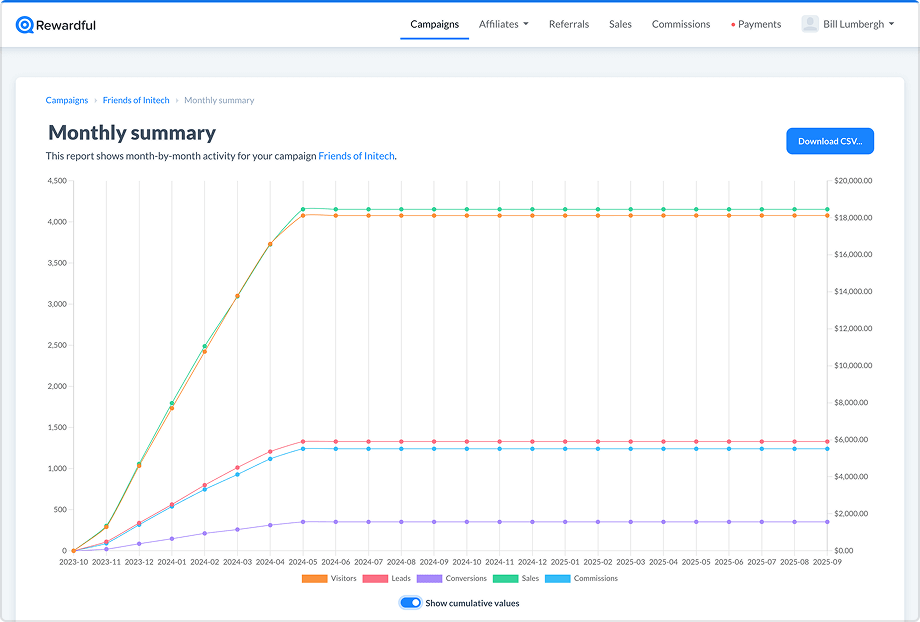When you’re building a SaaS business on your own, your brand is personal. One shady affiliate tactic (like bidding on your name in Google Ads or sending bot traffic to your website) can undo months of trust-building.
Affiliate Traffic Comes With Real Risks
The affiliate marketing industry is booming, and bad actors are keeping pace. Fraudulent affiliates use clever tactics that hurt your credibility, distort analytics, and claim undeserved commissions. All these risky strategies are becoming more common, draining both your revenue and your time.
And the worst part is that it’s not equal for everyone; these tactics hurt solo founders the most. Here’s why:
- Lost revenue from paying out fraudulent commissions.
- Damaged trust with real customers and affiliates.
- Time lost by manually spotting and removing bad actors.
- Distorted analytics that make decision-making harder.
To prevent these issues from happening, you need to know how to identify them. Here are some of the most common forms of affiliate fraud, along with safety tips :
1. Brand Hijacking in Search Ads
Some affiliates bid on branded terms to drive traffic through their links. This can inflate your ad costs, divert conversions, and confuse potential customers. Worst of all, you’re paying affiliate commission for the traffic your own ads could be winning. For indie hackers with limited budgets, even a few rogue campaigns can have a noticeable impact.
Preventative tactic: set explicit ad restrictions in your affiliate terms and monitor branded keyword traffic closely.
2. Click Fraud
Bots or click farms generate fake clicks on affiliate links or ads, inflating traffic metrics and wasting ad spend. Detecting abnormal click patterns early protects both your budget and your attribution data.
Preventative tactic: track click-to-conversion ratios and watch for unusual spikes from single IP addresses or regions.
3. Typosquatting and URL Hijacking
Typosquatting is a common yet intricate form of affiliate fraud. This tactic includes fraudsters registering domains similar to yours to capture traffic and claim affiliate commissions.
Preventative tactic: monitor domain registrations and suspicious referrals, and include domain spoofing clauses in your affiliate agreements.
4. Fake Leads or Transactions
Some affiliates create fake accounts or use stolen credit cards to generate transactions that get refunded or canceled.
Preventative tactic: require verification of new accounts and track refund patterns to identify suspicious activity.
5. Low-Quality Traffic
Irrelevant or spammy visitors inflate metrics without contributing real value, skewing analytics and program decisions.
Preventative tactic: maintain minimum engagement thresholds and monitor bounce rates to flag poor-quality traffic.
Even with these manual preventative tactics, solo founders can still get caught. Somehow, even when you spend significant time policing affiliates, sophisticated fraud slips through the cracks. Luckily, that’s where Rewardful’s Traffic Source Control comes in.
How Does Rewardful’s Traffic Source Control Protect Your Brand?
Traffic Source Control protects your brand by blocking referrals from specific high-risk domains—including Google, Bing, Baidu, and Yandex (search ads included). You can toggle the blocklist per campaign to decide where the guardrails apply.

When a visitor comes through an affiliate link, Rewardful checks the referring domain. If it’s blocked, the visit is still valid for the customer, but the affiliate doesn’t earn credit.
So, what gets blocked and what gets allowed?
How Rewardful’s Traffic Source Control Feature Works
- Open your campaign, go to Settings, then Traffic Source Control.
- Toggle the blocklist on to block search-engine referrals.
- (Optional) Create separate campaigns for trusted partners with the toggle off.
Learn more about Traffic Source Control.
When to Use the Traffic Source Control Feature
Solo SaaS builders typically rely on Rewardful’s Traffic Source Control to keep their programs clean while scaling. Common use cases include:
- Default brand protection: enable the blocklist for all campaigns to prevent affiliates from running brand-term ads.
- Selective exceptions: allow trusted partners to run paid search in separate campaigns by toggling the blocklist off for just those campaigns.
- Launch or promo periods: keep the blocklist active to avoid floods of low-quality traffic claiming commissions during high-traffic campaigns.
To get the best results, document your blocklist rules clearly in your affiliate terms so everyone knows the expectations upfront. Keep “content” affiliates and “paid-search” partners in separate campaigns to maintain granular control. And as your program grows, periodically review your campaigns to ensure the rules still match your goals..
What Traffic Source Control Solves for Indie Hackers
- Stops brand hijacking search ads: affiliates can’t run paid search on your terms or claim commissions.
- Reduces bot and low-quality traffic: only genuine, high-value referrals are credited.
- Keeps programs clean as you scale: automatic enforcement eliminates the need for constant manual checks.
With traffic source controls in place, indie hackers can focus on program growth while Rewardful automatically enforces the rules that protect their brand and program integrity.
Real-Life Example of How Huntr Stopped Brand-Bidding Abuse with Traffic Source Control
Huntr’s affiliate program took off fast, but early momentum came with a snag: a handful of affiliates were bidding on their branded keywords in Google Ads. With Rewardful’s guidance, they disabled the offending accounts and enabled Traffic Source Control—keeping their brand protected while their program continued to grow (from 0 to 100+ affiliates in only a few months!).
Automate Brand Protection with Rewardful’s Traffic Source Control
With Rewardful’s Traffic Source Control, you can automatically stop brand hijacking, bot clicks, and low-quality referrals. Focus on growth, while Rewardful enforces the rules that keep your affiliate program clean.
Learn more about Traffic Source Control.
Rewardful’s Traffic Source Control for Indie Hackers FAQs
1. Can I Block Only Certain Affiliates or Campaigns?
Yes. You can toggle the blocklist per campaign, allowing trusted partners to run paid search separately while keeping the rest of your program protected. You can block referrals from high-risk domains, including Google, Bing, Baidu, and Yandex search ads.
2. Will Legitimate Clicks from Content, Social, or Email Campaigns Still Count?
Absolutely. Affiliate traffic from blogs, newsletters, social posts, private communities, and review sites remains credited when it originates from the affiliate’s domain.
3. Do I Need to Manually Monitor Affiliate Traffic After Enabling the Blocklist?
No. Rewardful enforces the rules automatically, though periodic reviews are recommended to ensure your campaigns evolve with your affiliate program’s growth.
4. How do I Get Started with Traffic Source Control?
Simply navigate to your campaign settings, toggle the blocklist, and optionally create separate campaigns for trusted partners. Enforcement is immediate.














